
Trisoma®
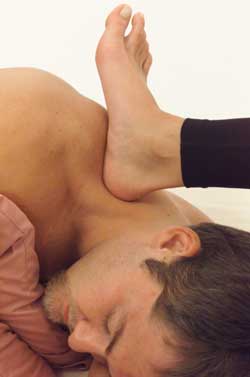
Barefoot Deep Tissue Bodywork
... also known as Compressive Deep Tissue, or Barefoot Sports Massage, is a blend of Eastern barefoot modalities coupled with Western manual medicine techniques. Typically the client is clothed, lying on a floor mat, and no oil is used. John Harris, the Late Olympic Massage Therapist, included the term Barefoot Sports Massage, because he used such techniques on muscular, as well as petite athletes and musicians, professionals who operate at near failure, and truly benefit from deep massage therapy techniques. [1]
Deep Bodywork with Less Pressure
While a superficial swedish massage can be very relaxing and therapeutic, to manipulate muscle, fascia, tendons and other tissues more deeply and effectively (and more cost-effectively), massage needs to be applied deeper (with more force, but typically less pressure than that using a pointy elbow or thumb) and with various techniques. The heel, sesamoid, arch or whole plantar surface of foot may be used, depending on the shape or pressure required. The therapist may be standing or sitting, depending on the angles required. Sensitive feet are excellently effective for such compression, tension and shear work, which can send the client into parasympathetic response, while also working toward the goal to "fix pain" and improve function.
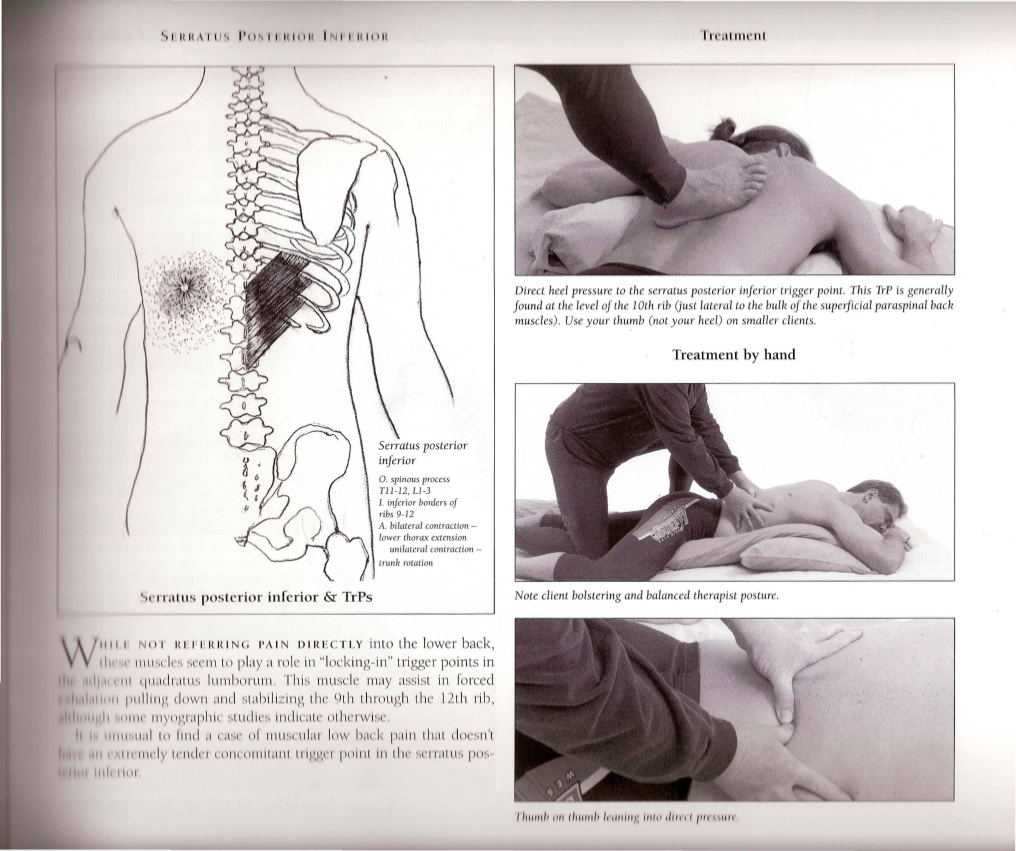
Therapeutic Effects of Barefoot Massage
Click here for Deeperwork™ Explanation of Therapeutic Effects of Barefoot Compression Massage which serve to:- relax, soften and lengthen hypertonic muscles
- eliminate metabolites and toxins from muscles, veins and lymph channels
- increase cellular nutrition – released histamines dilate capillaries
- accelerate nerve firing – acetylcholine release
- accelerate healing – stimulates procollagen fiber formation
- increase blood circulation
- reduce pain and improve range of motion – ischemic pressure inhibits/ eliminates trigger points
- accelerate muscle healing and recovery
- feel good during – vagal tonus and parasympathetic dominance
- feel good after – altered mood (hypnogogic trance) caused by compressions of Ruffini nerve endings transducing endogenous morphines, cannabinoids and other neurotransmitters of altered states1
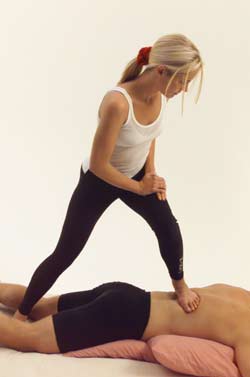
Typical Sessions
Sessions may last 2 minutes concentrating on a specific problem area, or an hour or more for a general full-body treatment. When desired, stretching, repositioning, elbow or hand work is also easy to accomplish. Tools may be as minimal as a floor mat and several pillows.
Barefoot Deep Tissue allows the therapist to apply:- broader range of pressure
- wider range of bearing angles
- more force
- more concentration
- more time without fatigue
- less strain
- minimal set up time
- more choices of positions for client and practitioner
...to manipulate tissue, perform passive stretch and assess range of motion. Thus the principles of Trigger Point Therapy, Myofascial Release, and various Sports Massage and Deep Tissue and even cross-fiber friction (deep transverse friction) techniques may be applied more effectively, producing more therapeutic progress and healing per session for the more sophisticated and demanding clients, such as professional dancers, athletes and musicians. Just like "riding a bicycle", once you experience this modality, it will be hard to go back to just "walking".
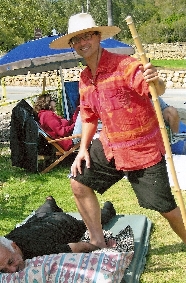
Trisoma's clients, ranging from 97 lbs to +350 lbs, are frequently amazed at the convenience and the exceptional results. For those clients who have complained of light pressure in other work, this should be a welcomed relief. As with any deep tissue work, doctor's recommendation is advised. (This modality is different from Yumeiho, Barefoot Lomi Lomi, Fijian Barefoot, Chavutti Thirummal or Ashiatsu, which is similar to Swedish/ Deep Tissue with oil using the feet and elevated monkey bars or ropes.) [2]
John Harris, procleusmatic mentor who worked in the 1984 Olympics and developed this modality, has trained thousands of bodyworkers around the world, including at The Santa Barbara Body Therapy Institute. Mr. Harris stated that the combination offers a potent new tool for powerfully satisfying, effective deep tissue massage, sports massage and Trigger Point Therapy regardless of client's size or build. The 41-year-old Olympic Swimmer Dara Torres received barefoot compression massage on a daily basis during her training for the 2008 Olympics. With a 70 percent attrition rate for sports massage therapists within the first three years of practice[3], and over 75% of practicing massage therapists experiencing symptoms of injury at some point in their careers[4], and the AMTA reporting that an average massage industry career lifetime lasting 6.3 years[5], this modality will help extend careers, as well as provide those clients whose demands are far beyond the limits of 'skin polishing' and 'moisturizing', and desire true Deep Compressions.
"clothes on, no oil, pain gone™"
No oil is used and clients remain loosely clothed- no jeans, please.
History
This modality has roots in Eastern modalities including Barefoot Shiatsu Massage, Chavutti Thirumal, Karali, TuiNa, LomiLomi; and from Western manual medicine including Deep Tissue, Myofascial Release, Trigger Point Therapy, transverse friction, compression, tension, shear, PNF, stretching and other techniques.
For those clients whose demands are far beyond the limits of 'skin polishing' and 'moisturizing', and desire true Deep Work,
there is...
Barefoot Deep Tissue DVD by John Harris
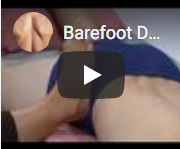
Our YouTube channel has been demonetized by Google, so we are moving to another provider soon.
References
1. Fred Kenyon & John Harris,
Fix Pain: Bodywork Protocols for Myofascial Pain Syndromes
© 2002, Press4Health Press
(Return to Reference 1 in text)
2.
If a bodyworker claims that barefoot massage on a mat is "uncomfortable, rigorous and rough",
then they are not a good barefoot massage therapist.
If a bodyworker claims to use centrifugal or centripetal forces, ask him or her what will be spinning during your session (besides rhetoric). However Watsu and acro-yoga can employ these forces.
(Return to Reference 2 in text)
3. John Harris.
(Return to Reference 3 in text)
4. Lauriann Greene, Robert A. Greene.
Save Your Hands! Injury Prevention for Massage Therapists
Gilded Age Press; 1st edition (April 11, 2000), ISBN-10: 0967954908, ISBN-13: 978-0967954905
(Return to Reference 4 in text)
5. 2008 AMTA Industry Survey.
2009 Massage Therapy Industry Fact Sheet.
Viewed 2009-03-09 from http://www.amtamassage.org/news/MTIndustryFactSheet.html
(Return to Reference 5 in text)
Images
1.
Photo photo of barefoot therapy on upper trapezius
© Fix Pain, used with permission
(Return to Image 1 in text)
2.
Sample Page from Fix Pain book by John Harris and Fred Kenyon showing back muscles
© Fix Pain, used with permission
(Return to Image 2 in text)
3.
Photo photo of barefoot therapy on posterior serratus
© Fix Pain, used with permission
(Return to Image 3 in text)
4.
Photo by Rebecca 2007
Paul barefoot deep tissue massage at iMadonnari in Santa Barbara
(Return to Image 4 in text)
5.
Screenshot of YouTube video by Trisoma
(Return to Image 5 in text)